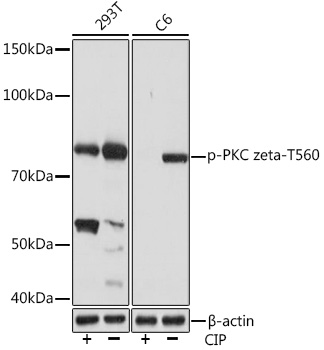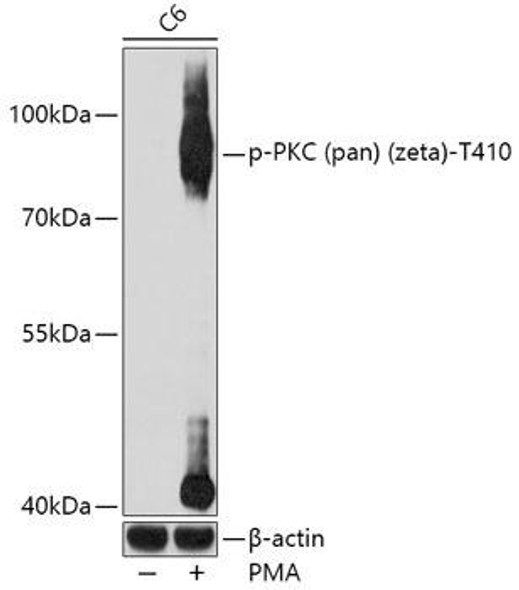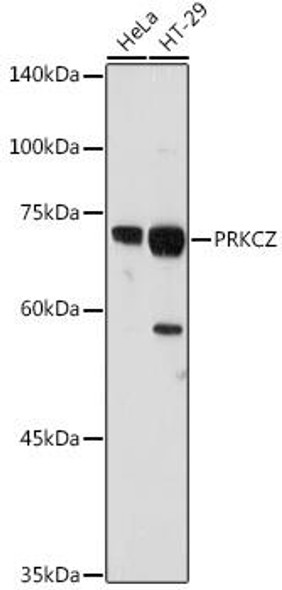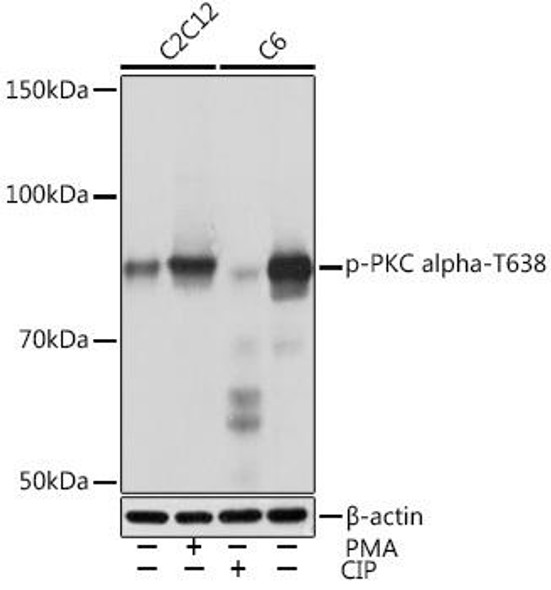Phospho-PKC zeta-T560 Monoclonal Antibody (CABP1149)
- SKU:
- CABP1149
- Product Type:
- Antibody
- Reactivity:
- Human
- Rat
- Host Species:
- Rabbit
- Isotype:
- IgG
- Antibody Type:
- Monoclonal Antibody
- Research Area:
- Immunology
Description
Anti-Phospho-PKC zeta-T560 Antibody (CABP1149)
The Phospho PKC-zeta (T560) Rabbit Monoclonal Antibody (CABP1149) is a highly specific and sensitive tool for studying the phosphorylation of PKC-zeta at threonine 560. This post-translational modification is known to play a crucial role in the activation and function of PKC-zeta, a member of the protein kinase C family involved in various cellular processes such as cell proliferation, differentiation, and apoptosis.This antibody, developed using rabbit monoclonal technology, offers exquisite specificity and sensitivity for detecting phosphorylated PKC-zeta (T560) in human samples. It is validated for use in Western blotting applications, enabling accurate and reliable detection of the phosphorylated form of PKC-zeta in various cell types and tissues.
The Phospho PKC-zeta (T560) Rabbit Monoclonal Antibody (CABP1149) is an essential tool for researchers studying the signaling pathways involving PKC-zeta and its phosphorylation status. By understanding the role of phosphorylated PKC-zeta in cellular function and diseases such as cancer and neurodegenerative disorders, this antibody aids in advancing our knowledge of these critical processes and may lead to the development of novel targeted therapies.
| Antibody Name: | Anti-Phospho-PKC zeta-T560 Antibody |
| Antibody SKU: | CABP1149 |
| Antibody Size: | 20uL, 50uL, 100uL |
| Application: | WB |
| Reactivity: | Human, Rat |
| Host Species: | Rabbit |
| Immunogen: | A phospho specific peptide corresponding to residues surrounding T560 of human PKC zeta |
| Application: | WB |
| Recommended Dilution: | WB 1:500 - 1:2000 |
| Reactivity: | Human, Rat |
| Positive Samples: | 293T, C6 |
| Immunogen: | A phospho specific peptide corresponding to residues surrounding T560 of human PKC zeta |
| Purification Method: | Affinity purification |
| Storage Buffer: | Store at -20°C. Avoid freeze / thaw cycles. Buffer: PBS with 0.02% sodium azide, 0.05% BSA, 50% glycerol, pH7.3. |
| Isotype: | IgG |
| Sequence: | Email for sequence |
| Gene ID: | 5590 |
| Uniprot: | Q05513 |
| Cellular Location: | |
| Calculated MW: | 68kDa |
| Observed MW: | 76KDa |
| Synonyms: | PKC-ZETA, PKC2 |
| Background: | Protein kinase C (PKC) zeta is a member of the PKC family of serine/threonine kinases which are involved in a variety of cellular processes such as proliferation, differentiation and secretion. Unlike the classical PKC isoenzymes which are calcium-dependent, PKC zeta exhibits a kinase activity which is independent of calcium and diacylglycerol but not of phosphatidylserine. Furthermore, it is insensitive to typical PKC inhibitors and cannot be activated by phorbol ester. Unlike the classical PKC isoenzymes, it has only a single zinc finger module. These structural and biochemical properties indicate that the zeta subspecies is related to, but distinct from other isoenzymes of PKC. Alternative splicing results in multiple transcript variants encoding different isoforms. [provided by RefSeq, Jul 2008] |
| UniProt Protein Function: | PKCZ: an AGC kinase of the PKC family. An atypical PKC: its activity is not regulated by Ca2+, PS, DAG or phorbol esters. Constitutively active. |
| UniProt Protein Details: | Protein type:Kinase, protein; Protein kinase, Ser/Thr (non-receptor); Protein kinase, AGC; EC 2.7.11.13; AGC group; PKC family; Iota subfamily Chromosomal Location of Human Ortholog: 1p36.33-p36.2 Cellular Component: cell junction; cytoplasm; cytosol; intercellular junction; membrane; plasma membrane; vesicle Molecular Function:insulin receptor substrate binding; protein binding; protein kinase activity; protein kinase C activity; protein serine/threonine kinase activity Biological Process: activation of NF-kappaB transcription factor; establishment of cell polarity; negative regulation of insulin receptor signaling pathway; negative regulation of peptidyl-tyrosine phosphorylation; negative regulation of protein complex assembly; peptidyl-serine phosphorylation; positive regulation of insulin receptor signaling pathway; positive regulation of interleukin-4 production; positive regulation of T-helper 2 cell differentiation; protein amino acid phosphorylation; signal transduction; transforming growth factor beta receptor signaling pathway |
| NCBI Summary: | Protein kinase C (PKC) zeta is a member of the PKC family of serine/threonine kinases which are involved in a variety of cellular processes such as proliferation, differentiation and secretion. Unlike the classical PKC isoenzymes which are calcium-dependent, PKC zeta exhibits a kinase activity which is independent of calcium and diacylglycerol but not of phosphatidylserine. Furthermore, it is insensitive to typical PKC inhibitors and cannot be activated by phorbol ester. Unlike the classical PKC isoenzymes, it has only a single zinc finger module. These structural and biochemical properties indicate that the zeta subspecies is related to, but distinct from other isoenzymes of PKC. Alternative splicing results in multiple transcript variants encoding different isoforms. [provided by RefSeq, Jul 2008] |
| UniProt Code: | Q05513 |
| NCBI GenInfo Identifier: | 68067736 |
| NCBI Gene ID: | 5590 |
| NCBI Accession: | Q05513.4 |
| UniProt Secondary Accession: | Q05513,Q15207, Q5SYT5, Q969S4, A8K4N0, A8MU64, B7Z2J7 E9PCW2, |
| UniProt Related Accession: | Q05513 |
| Molecular Weight: | 56,136 Da |
| NCBI Full Name: | Protein kinase C zeta type |
| NCBI Synonym Full Names: | protein kinase C zeta |
| NCBI Official Symbol: | PRKCZ |
| NCBI Official Synonym Symbols: | PKC2; PKC-ZETA |
| NCBI Protein Information: | protein kinase C zeta type |
| UniProt Protein Name: | Protein kinase C zeta type |
| UniProt Synonym Protein Names: | nPKC-zeta |
| Protein Family: | Protein kinase |
| UniProt Gene Name: | PRKCZ |
| UniProt Entry Name: | KPCZ_HUMAN |








